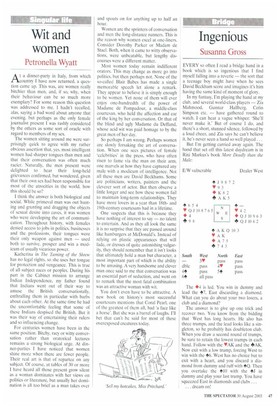Wit and women
Petronella Wyatt
Atc a dinner-party in Italy, from which ountry I have now returned, a question came up. This was, are women really bitchier than men, and, if so, why, when their behaviour can be so much more exemplary? For some reason this question was addressed to me. I hadn't recalled, alas, saying a bad word about anyone that evening, but perhaps as the only female journalist present I was rashly considered by the others as some sort of oracle with regard to members of my sex.
The women sitting around me were surprisingly quick to agree with my rather obvious assertion that, yes. most intelligent women had sharper tongues than men and that their conversation was often much racier. Naturally, the men present were delighted to hear their long-held grievances confirmed, but wondered, given that their own sex had been responsible for most of the atrocities in the world, how this should be so?
I think the answer is both biological and social. While primeval man was out hunting and grunting and dragging the objects of sexual desire into caves, it was women who were developing the art of communication. Throughout history, with females denied access to jobs in politics, businesses and the professions, their tongues were their only weapon against men — used both to survive, prosper and win a modicum of usually vicarious power.
Katherina in The Taming of the Shrew has no legal rights, so she uses her tongue for protection and vengeance. This is true of all subject races or peoples. During his part in the Cabinet mission to arrange Indian Independence, my father found that Indians went out of their way to amuse the British conversationally, enthralling them in particular with barbs about each other. At the same time he had the uncomfortable feeling that some of these Indians despised the British, But it was their way of entertaining their rulers and so influencing change.
For centuries women have been in the same position. Bitchy, racy or witty conversation rather than oratorical lectures remains a strong biological urge. At dinner-parties I have noticed that women shine more when there are fewer people. Their real art is that of repartee on any subject. Of course, at tables of 30 or more I have heard all those present grow silent as a woman dominates with her views on politics or literature, but usually her domination is all too brief as a man takes over and spouts on for anything up to half an hour.
Women are the sprinters of conversation and men the long-distance runners. This is the reason why women excel at one-liners. Consider Dorothy Parker or Madam de Stael. Both, when it came to witty observations, were unbeatable, but lengthy discourses were a different matter.
Most women today remain indifferent orators. This may change as more go into politics, but then perhaps not. None of the so-called Blair Babes has made a single memorable speech let alone a remark. They appear to believe it is simply enough to be women. Yet none of them will ever enjoy one-hundredth of the power of Madame de Pompadour, a middle-class courtesan, who held the affection and ear of the king by her conversation. Or that of the blind and ugly Madame du Deffand, whose acid wit was paid homage to by the great men of her day.
So perhaps I am wrong. Perhaps women are slowly forsaking the art of conversation. When one sees pictures of female 'celebrities' in the press, who have often risen to fame via the man on their arm, one marvels at how they have captured any male with a modicum of intelligence. Not all these men are David Beckhams. Some are politicians, writers, painters and the cleverer sort of actor. But then observe a little longer and see how these women fail to maintain long-term relationships. They have more lovers in a year than 18thand 19th-century courtesans had in a lifetime.
One suspects that this is because they have nothing of interest to say — no talent to entertain. And as they all look the same it is no surprise that they are passed around like hamburgers at McDonald's. Instead of relying on plastic appearances that will fade, or dresses of quite astonishing vulgarity, they should remember that it isn't looks that ultimately hold a man but character, a most important part of which is the ability to be amusing. A very handsome and clever man once said to me that conversation was an essential part of seduction, and went on to remark that the most fatal combination was an attractive woman with wit.
You don't even have to be attractive. A new book on history's most successful courtesans mentions that Coral Pearl, one of the greatest of them all, had 'a face like a horse'. But she was a barrel of laughs. I'll bet that can't be said for most of these overexposed creatures today.


























































 Previous page
Previous page